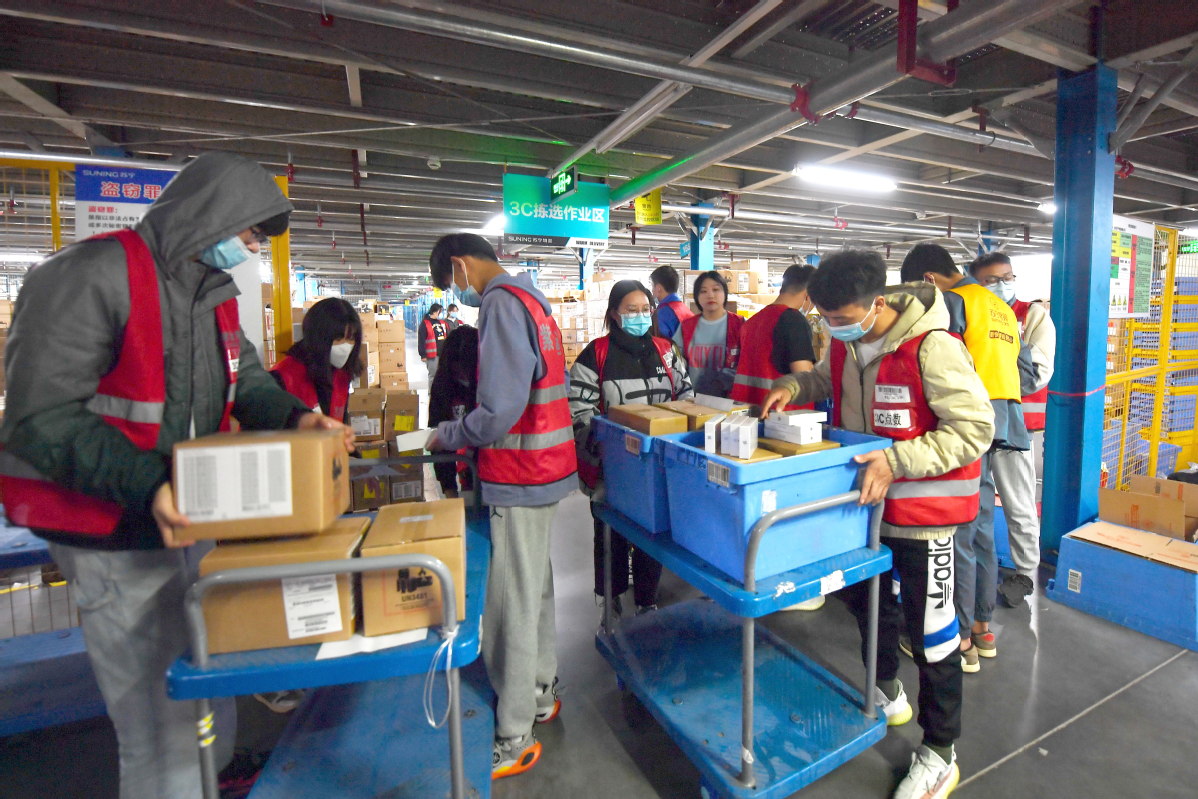Tech employed to facilitate Singles Day shopping spree


Machines, devices improve efficiency as record number of packages shipped
As a record number of packages are shipped as part of the Singles Day shopping spree, technology is being used to ensure faster, safer and more accurate deliveries.
On Singles Day, which fell on Wednesday, 675 million packages-the most ever for one day-were handled, according to the State Post Bureau, the country's delivery services regulator.
The figure is an increase of 26.16 percent over last year's Nov 11 online shopping festival.
To cope with the soaring need for express-delivery services, technologies including automatic sorting and wrapping machines, upgraded scan systems and wearable devices for couriers are being used to improve the efficiency and accuracy of delivery services.
At a transfer hub in Zhuozhou, Hebei province, belonging to ZTO Express, one of China's major express-delivery companies, a machine automatically sorts packages.
The hub, about an hour's drive from downtown Beijing, is providing delivery services to the capital and part of Hebei.
A package unloaded from a truck by workers is placed on a conveyor belt, which rolls it into an automatic sorting machine. It is then scanned and recorded by the system before the belt drops it into a collection bag along with other packages bound for the same community.
Once a bag has been filled, it is loaded onto a truck and transported to an express delivery station. From there, couriers will pick up packages and start delivering them.
Wang Zhaofu, head of the transfer hub, said the machine has four lines, and each line can sort 70,000 packages an hour, with 150 people working alongside the machine.
In the past, with old-school sorting machines, it took three times as many workers to handle the same amount of packages per hour.
On Wednesday, all four lines were operating to handle the first batch of packages for this year's Singles Day.
"The express delivery business is evolving from a human-dependent operation to a more intelligent one," Wang said. "The auto-sorting machine saves us labor costs and also greatly improves efficiency and accuracy."
In the past, he said, when the sorting work was mainly done by people, the work was slower and the employees sometimes made mistakes, such as putting a package in the wrong bag.
Wang said the hub, which opened last year, can handle 5 million packages a day and will handle more than half the company's packages bound for the capital.
Auto-wrapping machines also save time.
At a wrapping workshop at Beijing Suning Logistics Company, worker Ding Ding uses such a machine to wrap 300 packages an hour, three times more than he could by hand.
"A machine never feels tired," he said. "It can work all the time."
Ding operates the machine for about 10 hours a day during the shopping spree.
He said machine wrapping is also more environmentally friendly because it uses heat to seal packages instead of tape.
Accuracy enhanced
Upgraded scanners are also being used, shortening processing time and helping make deliveries more accurate.
Such a scanner is installed at a transfer hub belonging to Yunda Express in Xianghe, Hebei, near Beijing.
The machine is capable of scanning and recording a package in less than a second.
"In the past, the old machine scanned fewer than 1,000 packages an hour, and sometimes workers needed to flip the package for the machine to recognize the bar code," said Liu Yongjun, assistant to the general manager of Yunda Express' Beijing office.
He said the upgraded machine, adopted last year, can presently scan 1,800 packages an hour.
"No more flipping is needed," as the scanner has also enhanced the accuracy of bar code recognition, Liu explained.
"In the past, one worker operated one machine. Now a worker can operate five at the same time," Liu said.
Efficiency improvements are not only being experienced at transfer hubs, but also by deliverymen.
Courier Li Guangyue, who works for SF Express, received a set of wearable devices last month-a watch-like device that can be worn on the wrist, a card-like device that can be pinned on clothes and a Bluetooth earpiece.
When he picks up a package, Li uses the new "card" to scan it.
"Compared with the traditional scanner, the new one is more sensitive," he said.
"When I lift the card, it lights up and can usually finish scanning in a second."
Li works in Beijing's central business district and said he likes the watch-like device because it shows the company "cares about the health of us couriers".
"During the shopping festival, we usually work long hours every day," he said.
"The 'watch' will remind me to take a break when it senses that I have worked more than eight hours continuously. It also reminds me to take a rest when my heart beats too fast."
Li can also see his driving speed and location on the "watch", which he said is "very useful".
According to the State Post Bureau, November each year is the start of the busy season for the delivery industry.
This year's peak season for delivery business is from November to the Spring Festival, which begins on Feb 12.
After Singles Day, the busy delivery period will last for a few more days.
The bureau estimated 2.97 billion packages will be handled from Nov 11 to 16, up 28 percent year-on-year.
During this period, an average of 490 million packages are expected to be delivered every day, double the amount during off-peak times.

- Beijing courts boost efforts to resolve livelihood-related cases
- Reminder tips from Weifang police spark buzz on Xiaohongshu
- Former head of national tobacco body stands trial on bribery charges
- China warns DPP's attempt to seek 'Taiwan independence' will be futile
- Consistent progress seen in environmental protection
- Former head of China's State Tobacco Monopoly stands trial for graft, abuse of power





































